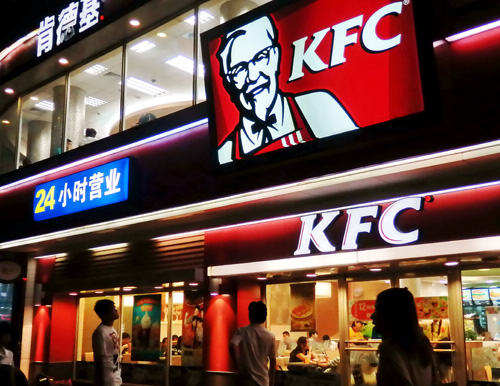|
 |
|
TROUBLED FOOD MOGUL: A KFC outlet in Shanghai (CFP) |
Some poultry farmers in east China's Shandong Province were found to have used excessive amounts of growth-boosting drugs in their chickens, which were then supplied to fast-food giants like KFC, raising further concerns in the country over food safety and the lack of severe penalties for violators.
The Chinese public is already accustomed to food and drug scandals, including tainted milk, illegally recycled waste cooking oil, toxic capsules and exploding watermelons. Those scandals have harmed the credibility of the country's food producers and grated consumers' nerves.
The chicken scandal has caused a growing number of Chinese consumers to question the credibility of chicken farmers. Government officials have pledged to intensify supervision of the poultry-raising industry. On the other hand, the industry may be reshuffled as the price of local drug-free chickens soars.
Drugged chicken
On December 18, China Central Television (CCTV), the country's national television station, reported that several Shandong-located chicken farms fed anti-biotics and hormones to chickens every day to reduce their death rate and quicken their growth.
Hormones, anti-biotics and anti-viral drugs, were all fed to the chickens to compensate for the unsanitary conditions in their cages, according to the CCTV report.
The owner of one of the farms says he gave the chickens at least 18 kinds of anti-biotics. Within a mere 40 days, the chickens' weight would surge upward of 3 kg.
To make matters worse, the chickens were found to be given drugs banned by the State Food and Drug Administration of China (SFDA).
According to the report, some chickens were fed anti-biotics two days before slaughter. China's poultry-raising regulations state that chickens cannot be given drugs at least one week before being slaughtered to ensure the drugs are no longer in their systems.
Two such farms in Gaomi and Pingdu, both in east China's Shandong Province, sold their chickens to a slaughterhouse in Pingdu, which belongs to Liuhe Group, the company that provides chicken to the China division of Yum Brands of Shanghai, which owns the KFC fast-food chain. Yum's logistics center then delivered the chicken to its fast-food stores, said the report.
Companies belonging to Liuhe Group also fabricated feeding logs for their chicken farms and produced quarantine qualifications without conducting any tests, said the report.
On December 21, the Shanghai Food and Drug Administration conducted a food safety check at KFC outlets. It found that one of 32 samples taken from eight batches of Yum Brands' raw chicken was suspected to be contaminated with the anti-viral medicine amantadine, which is banned for use in food.
The Shanghai food and drug authority has asked Yum to recall related products from its KFC restaurants and has launched a citywide inspection of KFC outlets.
Yum Brands Inc., the world's largest restaurant group, is believed to have known about the anti-biotics in its chicken as far back as 2010. Beijing Review was unable to reach Yum Brands for comment.
McDonald's and the Japanese fast-food chain Yoshinoya have also been embroiled in the chicken scandal.
On December 23, the Beijing Animal Inspection authority uncovered that 23 restaurants or food companies bought chicken from Liuhe Group, including Yoshinoya. Some dishes incorporating chicken have been withdrawn from sale at Yoshinoya restaurants in Beijing, reported the Xinhua News Agency.
On December 26, McDonald's admitted that the Liuhe Group was its second-tier supplier. It claims to have stopped using raw chicken from Liuhe since December 18.
During a press conference held on December 25, Bi Meijia, spokesman for the Ministry of Agriculture (MOA), said that relevant poultry raisers and processors have been shut down and are currently under investigation. The MOA has dispatched a group of experts to Shandong Province to inspect the matter, he said.
| 